Fruitful explorations of the circular economy during joint sustainability workshop
15 April 2019
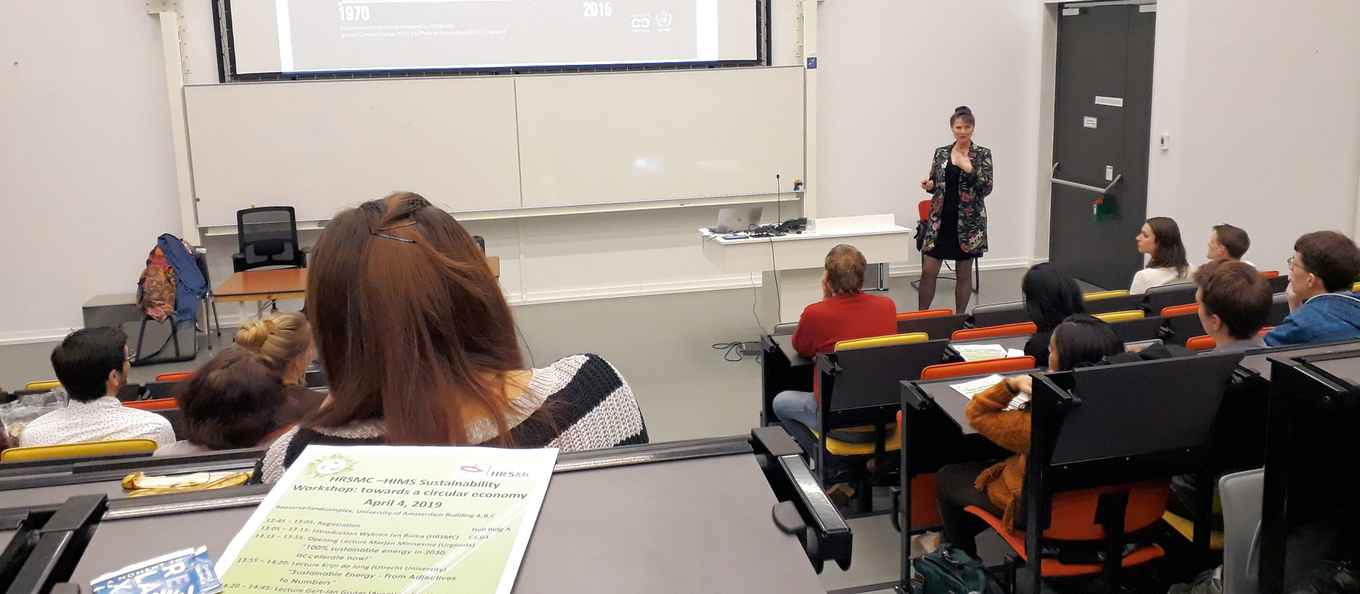
The workshop, organized in the context of the HRSMC’s Excellence Master-PhD program ‘Sustainability: the Molecular Approach’ and UvA's Research Priority Area Sustainable Chemistry, was attended by over seventy participants. These were mainly Master's and PhD students and chemistry staff members of Vrije Universiteit Amsterdam, Leiden University, and the University of Amsterdam, the three universities participating in the HRSMC. They were presented an afternoon that provided lots of context to the issues of sustainability and climate change. As one of the participants put it: "Most of us hope to contribute to a more sustainable planet by developing new concepts such as artificial photosynthesis. But while focusing on your own specific PhD project you often don't pay much attention to the bigger picture. Today has been a real eye-opener in that respect."
Better chemistry
Responsible for the programme and organization of the workshop were HRSMC PhD students Tessel Bouwens and David Klein, who both obtained their PhD positions as a result of the HRSMC Excellence Master Programme. They took turns in welcoming the speakers.
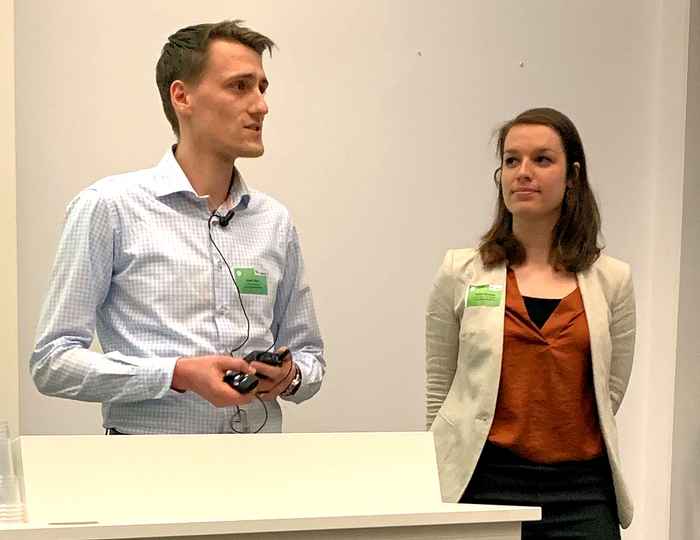
Prof. Peter van Tienderen, dean of the UvA's Science faculty, kicked off with an appeal to the attendants: "You are the brains to come up with solutions, developing chemistry that is not only better but also cheaper."
Then Dutch 'climate queen' Marjan Minnesma MBA took the stage for the main lecture. Minnesma heads the Dutch Urgenda Foundation that aims for a fast transition towards a sustainable society, with a focus on the transition towards a circular economy using only renewable energy. In 2015, Urgenda and Minnesma acquired fame by leading nine hundred co-plaintiffs towards victory in their 'climate case' against the Dutch government and forcing it to adopt more stringent climate policies. Last year, in an appeal by the Dutch government, the Court of Appeal in The Hague upheld that 2015 verdict.
In her lecture, Minnesma painted a rather bleak picture of the state of our planet referring to the decline in biodiversity, depletion of raw materials, and climate change. In all these fields she indicated challenges for chemists, but she also stressed the relevance of approaching issues from multiple perspectives, since focusing on one single issue bears the risk of introducing problems with respect to others. In her up-speed presentation she conveyed her sense of urgency and, illustrated with cases from Urgenda's rich history, she made a compelling case to "act now, and act fast".
"Scale up and hurry up"
Minnesma supports the Paris agreement that aims to limit the global temperature increase to well below 2 degrees Celsius and that encourages nations to pursue efforts to limit the increase even further to 1.5 degrees Celsius. There are, however, various issues when it comes to taking actions to achieve this. A crucial aspect is the uncertainty in the predictions on how the reduction of CO2 emissions will have the desired effect on limiting the global temperature increase.
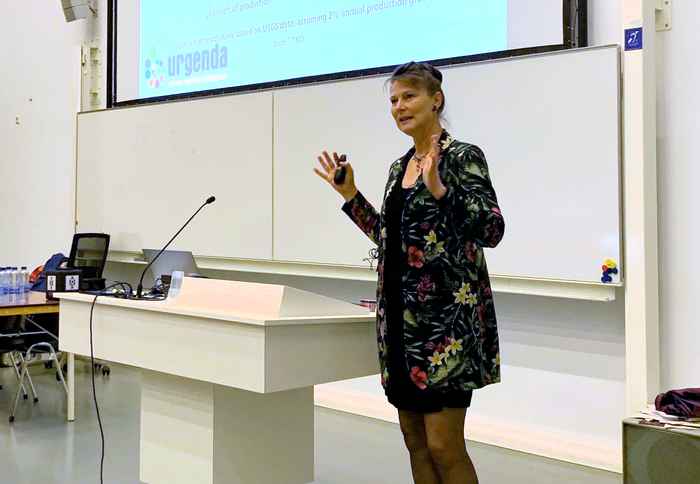
If we are overly optimistic, Minnesma argues, the targets for emission reduction are set too low and too late. Chances then are that ultimately efforts will have to be made to capture of CO2 from the atmosphere. Although that would for sure be a challenge for chemists, Minnesma hopes the world is able to avoid that. So her message is to "scale up, and hurry up" when it comes to reducing CO2 emissions. We should aim for 2030, she argues, and be ambitious.
Minnesma's message is, in essence, a positive one, since she is convinced that it is not yet too late. In contact with relevant parties in industry, Urgenda has learned that limiting emissions is far from impossible. "When asked, all told us that if they really have to, it can be done." Minnesma, therefore, urges governments to devise measures and facilities to support the necessary efforts. She advocates, amongst others, the development of CO2-efficient cycles and systems that can lead to industrial symbiosis concepts that effectively result in 'negative emissions'. Furthermore, solutions need to be found for storage and conversion of renewable electricity in hydrogen and chemicals. "That's where you come in," she told her audience. "Don't be optimistic if it makes you relax, don't be pessimistic if it makes you give up. Be an activist and ask, what can I do? The people who are crazy enough to think they can change the world, are the ones who do".
From adjectives to numbers
In his presentation on 'Sustainable Energy - From Adjectives to Numbers', Prof. Krijn de Jong from Utrecht University provided a frame of reference to put the field of sustainable energy in perspective. De Jong, who holds a chair in Inorganic Chemistry and Catalysis, reflected in particular on the world's energy need along the line of thought presented by David McKay in his book 'Sustainable Energy - without the hot air'.
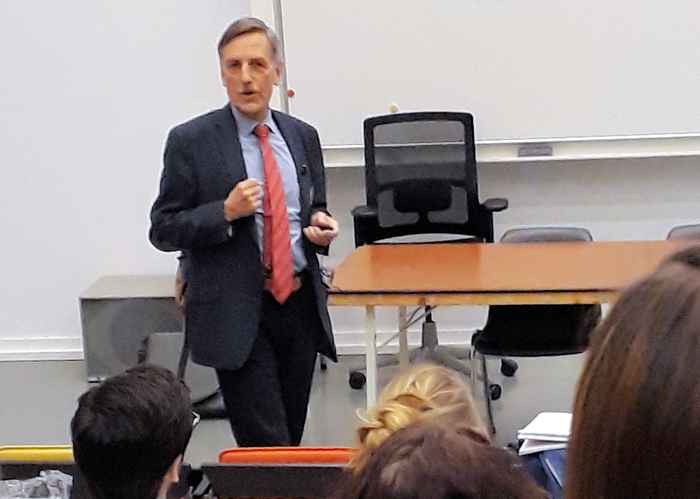
Compared to a meager 100 Watt necessary to sustain our bodily systems, humans consume massive amounts of energy to maintain their standard of living. The average Dutchman requires 6000 Watt, tripling the 2000 Watt power consumption of the average world citizen. Americans live even more energy-intensive with a required 10,000 Watt per person. This figure includes housing, heating, transport, in short, all activities to sustain the 'modern western' lifestyle.
Thus, with 7.5 billion inhabitants, the planet already requires 15 terawatts of power. De Jong stressed that we will not be able to generate that in a carbon-neutral fashion overnight - an immense growth of renewable energy generation is required just to keep up with the expected growth in energy consumption. So if we want to leave our grandchildren a liveable planet, De Jong argues, we have to take personal actions now. The Dutch for instance could almost halve their energy consumption by not taking intercontinental flights, reducing their car mileage and stop cluttering their houses with unnecessary products.
In the workshop session, led by De Jong after the plenary sessions, he took the participants on a number-crunching tour along a few itineraries of the transition pathway.
The plastic problem
Gert-Jan Gruter also presented dazzling numbers, not related to energy but to materials. Plastics, to be precise. As a threat to the global environment, according to Gruter "the plastics problem might even overtake the climate problem".
Gruter, who worked in polymer chemistry at DSM (1993-2000) and was Professor of Polymer Catalysis at Eindhoven University of Technology (1999-2006), currently is CTO at Avantium and professor of Industrial Sustainable Chemistry at the University of Amsterdam. He has, amongst others, been working on bio-based monomers (FDCA and ethylene glycol) and 100% bio-based polyesters such as PEF for bottles, fibres, and film.
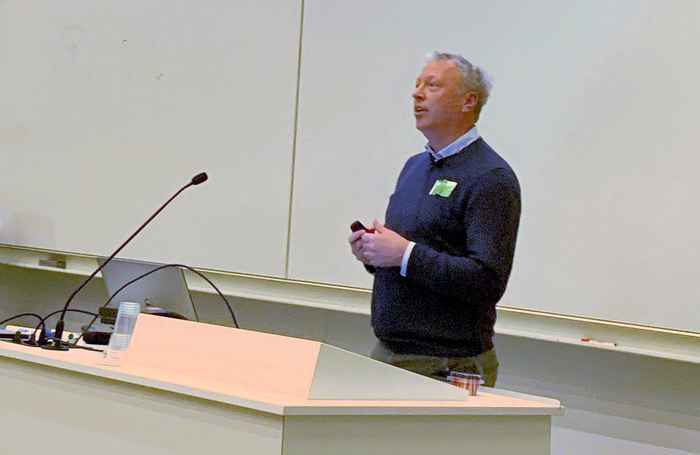
Monomer and polymer production accounts for around 80% of the total volume produced by the chemical industry. Currently, over three hundred million tonnes of plastic are produced yearly and this is expected to grow at a rate of 3-5%. It is this growth that provides the opportunity for transition, Gruter argues. Investments to increase plastic production capacity could be used to produce sustainable plastics from bio-based raw materials instead of oil.
Although this will reduce the CO2 footprint of the industry, it will hardly address the immense problem of plastic waste. Predictions have been made that in 2050 the mass of plastic in the oceans will surpass that of fish. Recycling has to be increased (a mere 9% of all the plastic bags ever produced has been recycled) and single use of plastic has to be minimized or even banned. Gruter proposes the development of multi-use plastics for packaging so that containers and bottles can be returned to the shop as in current deposit return schemes for glass bottles.
In his interactive workshop session following the plenary lectures, Gruter set out to investigate the requirements and opportunities for such multi-use plastics.
Sustainable jet fuel
The fourth and last plenary lecture was presented jointly by Dr Niek Persoon, director of Amsterdam Green Campus, and Dr Shiju Raveendran, Associate Professor of Catalysis Engineering at the University of Amsterdam. The theme of their lecture was the use of waste as a resource, to be able to close the circle from a linear towards a circular economy. They presented various initiatives in the Amsterdam metropolitan area where waste streams were used to extract valuables such as nutritional components or chemical building blocks.
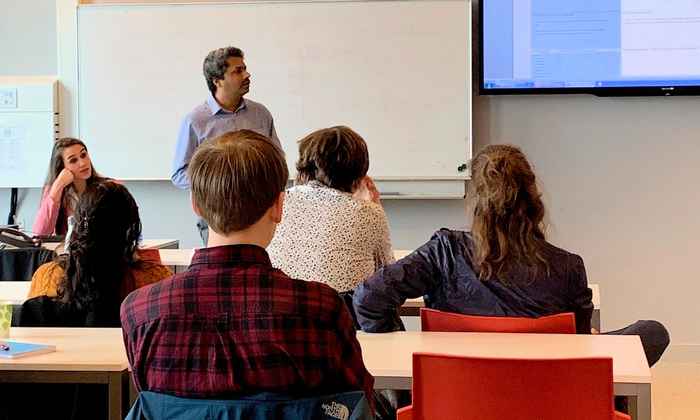
A particular case was the production of jet-fuel from non-recyclable organic waste, a project led by Shiju Raveendran with funding from Booking.com. Shiju gave a realistic view on the "unstoppable" need for air travel and on liquid fuels as the only viable option for providing the energy needed for that, at least in the short term. The synthesis of jet fuels from renewable sources, therefore, is an important option to lower the carbon footprint of air travel. Shiju advocated the implementation of a 'greenest' option on airline booking websites, in addition to the current options for 'fastest' or 'cheapest' air travel.
In their workshop session, Persoon and Shiju set out to explore the technical, societal and economic challenges associated with the use of renewable jet fuels.
Lively discussions
The three parallel workshop sessions following the plenary presentations all had an interested and motivated group of participants that, according to the session leaders, constructively contributed to lively discussions. During the closing of the day representatives from each session presented their highlights, after which Prof. Joost Reek, coordinator of the UvA's research priority area Sustainable Chemistry, presented the wrap-up of the day. He thanked speakers and audience for a valuable afternoon and urged all researchers to never stop looking for opportunities in the field of sustainability.